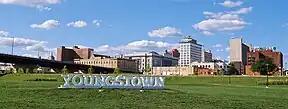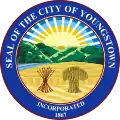Mahoning Valley
Youngstown–Warren, OH Metropolitan Statistical Area | ||
|---|---|---|
 Downtown Youngstown as viewed from Wean Park | ||
Youngstown–Warren–Salem, OH CSA
| ||
| Country | ||
| State | ||
| Largest city | Youngstown | |
| Other cities | Boardman Warren Austintown Niles Salem East Liverpool | |
| Elevation | 660–3,001 ft (200–915 m) | |
| Population (2020[1]) | ||
| • Urban | 320,901 (US: 127th)[2] | |
| • Urban density | 1,637.6/sq mi (632.3/km2) | |
| • Metro | 430,591 (US: 125th) | |
| • CSA | 532,468 (US: 87th) | |
| Time zone | UTC−5 (EST) | |
| • Summer (DST) | UTC−4 (EDT) | |
| ZIP codes | 4xxxx | |
| Area code(s) | 330, 234 | |
The Youngstown–Warren, OH Metropolitan Statistical Area, typically known as the Mahoning Valley, is a metropolitan area in Northeast Ohio with Youngstown, Ohio, at its center. According to the U.S. Census Bureau, the metropolitan statistical area (MSA) includes Mahoning and Trumbull counties.[3] As of the 2020 census, the region had a population of 430,591, making it the 125th-largest metro area in the country.[1]
Taking its name from the Mahoning River, the area has a large commuter population that works in Cleveland and Pittsburgh and their metropolitan areas. It is located in the Rust Belt, the former industrial region of the northern United States. The Youngstown–Warren–Salem combined statistical area adds the Salem micropolitan area and Columbiana County, Ohio to the region, increasing the total population to 532,468.[4] The Youngstown–Warren media market serves all three counties in the CSA, as well as the Mercer County, Pennsylvania and Lawrence County, Pennsylvania.
Steel industry
Although steel has been produced in the Mahoning Valley since the mid-1800s, after the Civil War, the valley was primarily known for its iron production. Conversion to steel manufacturing began during the economic depression of the 1890s.[5] The Mahoning Valley is suitable for steel manufacture because of "its proximity to the Lake Erie ports that receive iron ore…the coal fields of Ohio, Pennsylvania and West Virginia; and to limestone deposits."[6] The "25-mile stretch of steel mills and related industries" along the Mahoning River is similar to the Ruhr Valley in Germany."[6] Historically, it was part of the largest steel producing region in the world, leading to the historical "Steel Valley" moniker that the area shared with the Pittsburgh metropolitan area.
The local steel industry declined during the 1970s steel crisis. A notable plant closure occurred on September 19, 1977, when Youngstown Sheet and Tube abruptly closed its Campbell Works and furloughed 5,000 workers.[7] Today the area produces little steel, and is home to many scrap metal yards and aluminum plants.[8] A 2009 documentary, Steel Valley: Meltdown, addresses "the past, present and future of the Mahoning Valley" through the eyes of local experts, including one local organizer who stated, "We are the first generation completely removed from the days when steel mills were active."[9]
The Mahoning Valley Economic Development Corporation, founded in 1979, is active in economic revitalization and diversification. It owns two industrial parks, and has purchased local rail lines, including the Youngstown and Austintown Railroad and the Warren and Trumbull Railroad.[10]
Municipalities

Largest municipalities
| Population rank | City | County | State | 2020 census | 2010 census | Change | Peak population (year) |
|---|---|---|---|---|---|---|---|
| 1 | Youngstown | Mahoning | Ohio | 60,068 | 66,982 | −10.32%[11] | 170,002 (1930) |
| 2 | Boardman | Mahoning | Ohio | 40,213 | 40,889 | −1.65%[12] | 42,518 (2000) |
| 3 | Warren | Trumbull | Ohio | 39,201 | 41,557 | −5.67%[11] | 63,494 (1970) |
| 4 | Austintown | Mahoning | Ohio | 29,594 | 29,677 | −0.28%[13] | 33,636 (1980) |
| 5 | Niles | Trumbull | Ohio | 18,443 | 19,266 | −4.27%[11] | 23,072 (1980) |
| 6 | Hermitage | Mercer | Pennsylvania | 16,230 | 16,220 | +0.06%[11] | 16,365 (1980) |
| 7 | Sharon | Mercer | Pennsylvania | 13,147 | 14,038 | −6.35%[11] | 26,454 (1950) |
| 8 | Salem | Columbiana | Ohio | 11,915 | 12,303 | −3.15%[14] | 14,186 (1970) |
| 9 | Struthers | Mahoning | Ohio | 10,063 | 10,713 | −6.07%[11] | 15,631 (1960) |
| 10 | East Liverpool | Columbiana | Ohio | 9,958 | 11,195 | −11.05%[14] | 26,243 (1970) |
Cities, villages, and boroughs
|
Mahoning County
|
Trumbull County |
Columbiana County (CSA) |
Mercer County
|
Townships
|
Mahoning County |
Trumbull County |
Columbiana County (CSA) |
Mercer County
|
Demographics
| Census | Pop. | Note | %± |
|---|---|---|---|
| 1900 | 174,112 | — | |
| 1910 | 246,616 | 41.6% | |
| 1920 | 364,018 | 47.6% | |
| 1930 | 458,451 | 25.9% | |
| 1940 | 473,605 | 3.3% | |
| 1950 | 528,498 | 11.6% | |
| 1960 | 636,525 | 20.4% | |
| 1970 | 663,178 | 4.2% | |
| 1980 | 659,649 | −0.5% | |
| 1990 | 613,622 | −7.0% | |
| 2000 | 602,978 | −1.7% | |
| 2010 | 565,773 | −6.2% | |
| 2020 | 541,243 | −4.3% | |
| U.S. Decennial Census[15] | |||
| Census | Pop. | Note | %± |
|---|---|---|---|
| 1900 | 242,702 | — | |
| 1910 | 323,235 | 33.2% | |
| 1920 | 447,149 | 38.3% | |
| 1930 | 544,935 | 21.9% | |
| 1940 | 563,726 | 3.4% | |
| 1950 | 627,418 | 11.3% | |
| 1960 | 743,529 | 18.5% | |
| 1970 | 771,488 | 3.8% | |
| 1980 | 773,221 | 0.2% | |
| 1990 | 721,898 | −6.6% | |
| 2000 | 715,053 | −0.9% | |
| 2010 | 673,614 | −5.8% | |
| 2020 | 643,120 | −4.5% | |
| U.S. Decennial Census[16] | |||
As of the census[17] of 2000, there were 602,978 people, 238,319 households, and 162,896 families residing within the MSA. The racial makeup of the MSA was 86.88% White, 10.78% African American, 0.15% Native American, 0.45% Asian, 0.02% Pacific Islander, 0.55% from other races, and 1.17% from two or more races. Hispanic or Latino of any race were 1.70% of the population.
The median income for a household in the MSA was $36,071, and the median income for a family was $44,055. Males had a median income of $35,626 versus $23,186 for females. The per capita income for the MSA was $18,547.

| County | 2020 Census | 2010 Census | Change | Area | Density |
|---|---|---|---|---|---|
| Mahoning County | 228,614 | 238,823 | −4.27% | 425 sq mi (1,100 km2) | 538/sq mi (208/km2) |
| Trumbull County | 201,977 | 210,312 | −3.96% | 637 sq mi (1,650 km2) | 317/sq mi (122/km2) |
| Mercer County | 110,652 | 116,638 | −5.13% | 683 sq mi (1,770 km2) | 162/sq mi (63/km2) |
| Columbiana County | 101,877 | 107,841 | −5.53% | 535 sq mi (1,390 km2) | 190/sq mi (74/km2) |
Transportation
Airports
The Youngstown–Warren area is served by one regional and several county and local airports, including:
Major highways
Public transit
The Western Reserve Transit Authority (WRTA) operates a metropolitan public busing system in Mahoning and Trumbull counties. In Columbiana County, the Community Action Rural Transit System (CARTS) operates a rural public busing system.
Colleges and universities

The Mahoning Valley is home to a number of higher education facilities, including:
- Butler County Community College (Hermitage)
- Eastern Gateway Community College (Youngstown)
- Grove City College (Grove City)
- Kent State University at East Liverpool (East Liverpool)
- Kent State University at Salem (Salem)
- Kent State University at Trumbull (Warren)
- New Castle School of Trades (East Liverpool)
- Pennsylvania State University Shenango (Sharon)
- Thiel College (Greenville)
- Youngstown State University (Youngstown)
Sports
| Club | Sport | League (Conf) | Venue | Location |
|---|---|---|---|---|
| Mahoning Valley Scrappers | Baseball | New York–Penn League | Eastwood Field | Niles |
| Youngstown Phantoms | Ice hockey | United States Hockey League | Covelli Centre | Youngstown |
| Youngstown Nighthawks | Indoor soccer | Premier Arena Soccer League | Farmer Jim's Sports Complex | Cortland |
| Youngstown State University Penguins | various | NCAA (Horizon League, MVFC) | various, including Stambaugh Stadium | Youngstown |
NCAA Division I sports are played in the region, with Youngstown State University fielding eight men's and ten women's teams.
See also
References
- 1 2 "2020 Population and Housing State Data". United States Census Bureau, Population Division. August 12, 2021. Retrieved August 14, 2021.
- ↑ United States Census Bureau (December 29, 2022). "2020 Census Qualifying Urban Areas and Final Criteria Clarifications". Federal Register.
- ↑ "OMB Bulletin No. 23-01: Revised Delineations of Metropolitan Statistical Areas, Micropolitan Statistical Areas, and Combined Statistical Areas, and Guidance on Uses of the Delineations of These Areas" (PDF). United States Office of Management and Budget. July 21, 2023.
- ↑ "Table 2. Annual Estimates of the Population of Combined Statistical Areas: April 1, 2000 to July 1, 2009 (CBSA-EST2009-02)". 2009 Population Estimates. United States Census Bureau, Population Division. 2010-03-23. Archived from the original (CSV) on April 20, 2010. Retrieved 2010-03-30.
- ↑ "Ohio: Rise and Fall of the Steel Industry in the Mahoning Valley". (Local Legacies: Celebrating Community Roots – Library of Congress). Retrieved 2014-03-03.
- 1 2 "Mahoning Valley". Ohio Turnpike and Infrastructure Commission. Archived from the original on 2014-03-15. Retrieved 2014-03-03.
- ↑ Christie, Les. "The incredible shrinking city". CNNMoney.com. Retrieved 2004-04-24.
- ↑ Linkon, Sherry Lee; John Russo (2002). Steeltown U.S.A: work and memory in Youngstown. Lawrence, Kan.: University Press of Kansas. ISBN 978-0-7006-1161-4.
- ↑ Libecco, Katie (2009-09-19). "Local documentary gathers expert insight". Valley24.com. Retrieved 2014-03-04.
- ↑ "Mahoning Valley Economic Development Corporation – Revitalizing the Mahoning Valley". Retrieved 2014-03-03.
- 1 2 3 4 5 6 "U.S. Census Bureau QuickFacts: Struthers city, Ohio; Hermitage city, Pennsylvania; Sharon city, Pennsylvania; Niles city, Ohio; Warren city, Ohio; Youngstown city, Ohio". www.census.gov. Retrieved 23 March 2018.
- ↑ "Decennials - Census of Population and Housing". 8 February 2006. Retrieved 23 March 2018.
- ↑ "CENSUS OF POPULATION AND HOUSING (1790-2000)". U.S. Census Bureau. Retrieved 2010-07-17.
- 1 2 "Annual Estimates of the Resident Population for Incorporated Places: April 1, 2010 to July 1, 2015". Archived from the original on June 2, 2016. Retrieved July 2, 2016.
- ↑ United States Census Bureau. "Census of Population and Housing". Retrieved July 3, 2016.
- ↑ United States Census Bureau. "Census of Population and Housing". Retrieved July 3, 2016.
- ↑ "U.S. Census website". United States Census Bureau. Retrieved 2008-01-31.
Further reading
- Blue, Frederick J.; Jenkins, William D.; Lawson, William H.; Reedy, Joan M. (1995). Mahoning Memories: A History of Youngstown and Mahoning County. Virginia Beach, VA: The Donning Company. ISBN 0-89865-944-2.
- Ruminski, Clayton J. Iron Valley: The Transformation of the Iron Industry in Ohio’s Mahoning Valley, 1802—1913 (Ohio State University Press, 2017).

